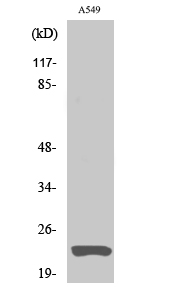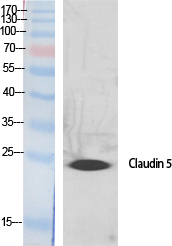

| WB | 咨询技术 | Human,Mouse,Rat |
| IF | 咨询技术 | Human,Mouse,Rat |
| IHC | 1/50-1/100 | Human,Mouse,Rat |
| ICC | 1/50-1/200 | Human,Mouse,Rat |
| FCM | 咨询技术 | Human,Mouse,Rat |
| Elisa | 1/10000 | Human,Mouse,Rat |
| Aliases | CLDN5; AWAL; TMVCF; Claudin-5; Transmembrane protein deleted in VCFS; TMDVCF |
| Entrez GeneID | 7122 |
| WB Predicted band size | Calculated MW: 23 kDa; Observed MW: 23 kDa |
| Host/Isotype | Rabbit IgG |
| Antibody Type | Primary antibody |
| Storage | Store at 4°C short term. Aliquot and store at -20°C long term. Avoid freeze/thaw cycles. |
| Species Reactivity | Human,Mouse |
| Immunogen | The antiserum was produced against synthesized peptide derived from human Claudin 5. AA range:169-218 |
| Formulation | Purified antibody in PBS with 0.05% sodium azide,0.5%BSA and 50% glycerol. |
+ +
以下是关于Claudin 5抗体的3篇参考文献及其简要摘要:
1. **"Size-selective loosening of the blood-brain barrier in claudin-5-deficient mice"**
- **作者**: Nitta et al.
- **摘要**: 该研究通过基因敲除小鼠模型,发现Claudin 5缺失会导致血脑屏障对小分子(<800 Da)的选择性渗透性增加,利用Claudin 5抗体证实了其在维持屏障完整性中的关键作用。
2. **"Endothelial claudin-5 regulates blood-brain barrier permeability and treatment of experimental stroke"**
- **作者**: Greene et al.
- **摘要**: 研究通过免疫组化和Western blot分析,证明缺血性中风模型中Claudin 5表达下调与血脑屏障破坏相关,并探讨了靶向Claudin 5的抗体在治疗中的潜在应用。
3. **"Claudin-5: Gatekeeper of neurological function in health and disease"**
- **作者**: Campbell et al.
- **摘要**: 综述总结了Claudin 5在神经退行性疾病(如阿尔茨海默病)中的作用,强调其抗体在检测血脑屏障渗漏及病理机制研究中的工具价值。
4. **"Conditional knockout of claudin-5 in endothelial cells impairs the blood-brain barrier"**
- **作者**: Morita et al.
- **摘要**: 利用内皮细胞特异性敲除模型,结合抗体标记技术,证实Claudin 5缺失直接导致血脑屏障结构异常,影响中枢神经系统稳态。
这些文献均通过Claudin 5抗体揭示了其在屏障功能调控及疾病机制中的关键角色。
Claudin 5 is a key component of tight junction proteins, predominantly expressed in endothelial and epithelial cells, where it regulates paracellular permeability and maintains cellular barrier integrity. It is especially critical in the blood-brain barrier (BBB), controlling the selective transport of molecules between the bloodstream and the central nervous system. Antibodies targeting Claudin 5 are widely used in research to study BBB dysfunction, vascular permeability, and pathological conditions such as neuroinflammation, neurodegenerative diseases (e.g., Alzheimer’s), and cancer metastasis, where Claudin 5 expression may be altered.
Structurally, Claudin 5 contains four transmembrane domains and two extracellular loops, with most antibodies developed against specific epitopes in these regions. These antibodies enable detection via techniques like Western blot, immunohistochemistry, and immunofluorescence, aiding in visualizing tight junction morphology and protein localization. Commercially available Claudin 5 antibodies are typically validated for reactivity in humans, mice, and rats, with applications in both in vitro and in vivo models.
Recent studies highlight Claudin 5's role in modulating drug delivery across the BBB, making its antibodies valuable for therapeutic research. Dysregulation of Claudin 5 is also linked to conditions like stroke, multiple sclerosis, and brain tumors, underscoring its diagnostic and therapeutic potential. However, variability in antibody specificity requires careful validation to ensure accurate experimental outcomes.
×